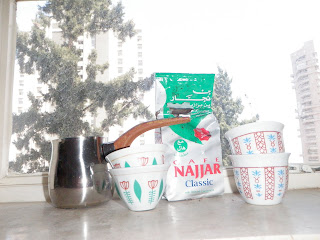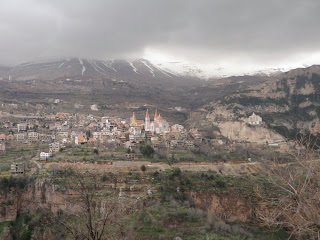As I begin to count my final days in Lebanon, I realize that I have overlooked some important issues in my sporadic blogging over the past several months. Lebanon has redefined how I think of the Middle East, and specifically the Levant (Lebanon, Jordan, Syria, Iraq, Palestine). Instead of viewing the region as one big nation, I've come to realize that every country has its own particularities. With its rich, pre-civil war history as the Paris of the Middle East, Lebanon is striving today, after all the bloodshed, to recapture this image, and it's doing a pretty good job. The Lebanese are very into their appearance and are beyond glamourous. Their dress is also shockingly revealing. I constantly feel underdressed and judged, even at the gym. I may have described the AUB gym to a few of you, but let me just say that it is a microcosm of Lebanese life in general. The tredmill at the gym is used more as a fashion runway than as an exercise machine. I am constantly judged for breaking a sweat and (gasp) running. One girl on my floor even irons her shirts before going to the gym. Around campus I've seen more nose jobs than I have in my entire life. Even the guys get them. I don't know why self-appearance is so important, but it really dominates many peoples' thoughts in Lebanon.
Religion is an interesting subject in Lebanon. During the civil war, Lebanon broke down into too many groups for me to remember, but a lot of them were along religious ties. However, there were some odd alliances that formed just so one group could grab more power. So power relations, not religious differences, were how people divided. Today, problems continue to exist, with people grouping themselves based on religious sect. When I first arrived here, I knew the majority of the population was Muslim, and expected the women to wear something like
this, as they had in the West Bank. Instead, I saw far fewer people wearing even the basic headscarf than I had expected. For a while I thought this was because AUB was expensive, and maybe Muslims didn't have access to the education or money to send their kids here. Not a single girl on my floor appeared to be Muslim. However, I soon realized that many of the Muslim girls on my floor, and in AUB in general, didn't wear a headscarf. They still are devout Muslims, praying multiple times a day and dressing conservatively, but they don't wear a headscarf. This was a totally revolutionary concept for me, although I knew Muslims in the US who choose not to wear a headscarf. I believe the fact that these girls don't wear headscarves shows that Islam can be lenient and adapt to the modern era, despite all we hear to the contrary in the US.
Lebanon is much more liberal than I imagined. Of course, life is still very family-oriented, as it was in the West Bank, but people are also very social outside of the family. The nightlife is over-the-top, with people staying out until 5 am or later. Everyone goes out, not just the Christians, but many of the Muslims do not drink. A day at AUB wouldn't be complete without seeing at least 10 couples making out on the many benches overlooking the Mediterranean, and I definitely wasn't expecting that in Lebanon.
It's very disturbing to hear the divisions among the Christian and Muslim Lebanese. The Christians definitely look down their (fake) noses at the Muslims. They blame them for all their problems, and most Christians I meet tell me how different they are from the Muslims that ruined Lebanon. I think this is mostly attributable to the colonial system established by the French, where the Christians were favored over the Muslims. This led to increased economic opportunity, and divisions arose. Also, the Christians belong to a religious community that is very much Western, whereas the Muslims living in Lebanon look towards Mecca for religious guidance. Honestly, I can't speak much to the Muslim side. I've heard a few Muslims complain about how Lebanon is so divided, etc, and they don't really take responsibility for the country's problems.
The issue of religion has been institutionalized in Lebanon. The government is a confessional system, so the Prime Minister is always a Sunni Muslim, the President is Maronite Christian, and the Speaker of the Parliament is a Shi'a Muslim. This system was established in the 1940s to represent the demographics of the country, but much has changed since then and now smaller groups have a disproportionate amount of power. Although Lebanon has been passed over by the recent uprisings in the Middle East, the youth are calling for an end to the sectarianism. However, all in one breath, they manage to condemn sectarianism and criticize another sect for their own problems, so it appears to be a never ending cycle.
Yesterday I went down to the South with the Cultural Club of the South. It turns out that this club is really a euphemism for the Hezbollah Club, but AUB has banned political clubs from campus. For the whole trip we were escorted by guards in an ambulance, who I later found out were the Hezbollah version of the Red Cross. We first went to the Mleeta: The Resistance Museum (another euphemism, this time for the Hezbollah Museum). The museum is set on a beautiful hilltop, looking out over the south of Lebanon. Israel occupied southern Lebanon up until 2000. Most of the museum was a display of Israeli Defense Forces garbage that was cool to look at, but wasn't anything special. However, it was apparent that a ton of money had gone into this project. Our guide said that the purpose of the museum was to show Westerners that Hezbollah wasn't a bunch of terrorists. There was also a display of a typical fighter bunker. That was about it. After the museum, we went down to the Lebanese-Israeli border. It was disconcerting to see UNFIL, Lebanese, and Israel armed forces all in such close proximity. The border was nothing more than a fence with about a 100 meters of no man's land in between. We got out and walked around a bit, then someone gave a speech about Hezbollah's mission to reclaim all of Palestine. My Palestinian friends kept looking off into Israel and saying "that is my land, doesn't it look gorgeous?" I can't imagine how hard it must be for them to look out at that land and know they can never live there.
I have very mixed opinions about Hezbollah. I don't think it's right to classify them as a terrorist organization, and I think it's mostly done by the US to justify its continued support of Israel. However, I do take issue with Hezbollah acting independent of the Lebanese government. No country should have two armies. I asked one of the guides on the trip about that, and he said that Hezbollah had to be separate from the government in order to carry out many of its secret missions and that the government supported them but there were a few too many corrupt politicians who were allied with Israel. Another girl chimed in, saying that Lebanon is divided between too people, so Hezbollah had to act independently of the government. I didn't buy it. They also said that Hezbollah was there to provide external security for Lebanon, while the Lebanese army kept the Lebanese from killing themselves, therefore making them responsible for internal security. So, while I believe Hezbollah can act offensively against Israel to protect the Lebanese and work for the Palestinians, I think this should be done under the auspices of the Lebanese government, not a political party.
I know I haven't said anything about my trip to Turkey, but I have a few pictures on facebook. Istanbul was fantastic, and I loved every second there. I think I saw everything there was to see, and was so exhausted after touring around for three days.
Also, another thing of note since I've last written has been Osama bin Laden's death. I haven't really witnessed much fallout from it in Lebanon, apart from the occasional Lebanese student saying that he isn't actually dead, but even the professors dismiss those comments. The most shocking response I received was from the US State Department, warning me not to go outside because of anti-American protests. Sometimes I wonder if the people who write these travel advisories are even in the countries they write about. All the emails I've received about Lebanon have been totally off the mark. As always, the news in the US or from Western sources is much more dramatic and aimed at scaring the reader than the facts on the ground. There's good reason why people are afraid to travel to the Middle East, and a lot of it has to do with what they read in the New York Times or other Western newspapers.
That's all I have to say for now. I hope I've conveyed a bit that the whole Middle East isn't a hotbed of extremism, and that life here is pretty normal and people just want to live their lives in peace. The next few weeks will be busy as the semester begins to wind down. I don't want my time in Beirut to end, but I am looking forward to my travels this summer as well.

















































